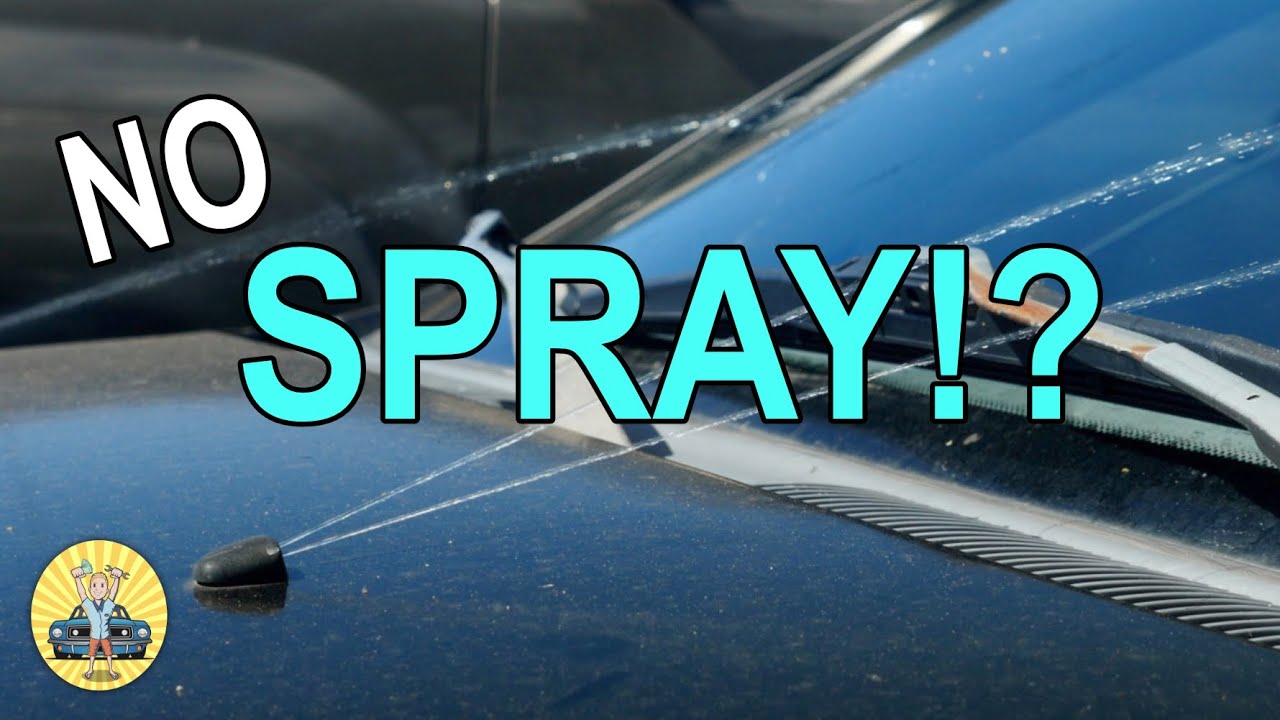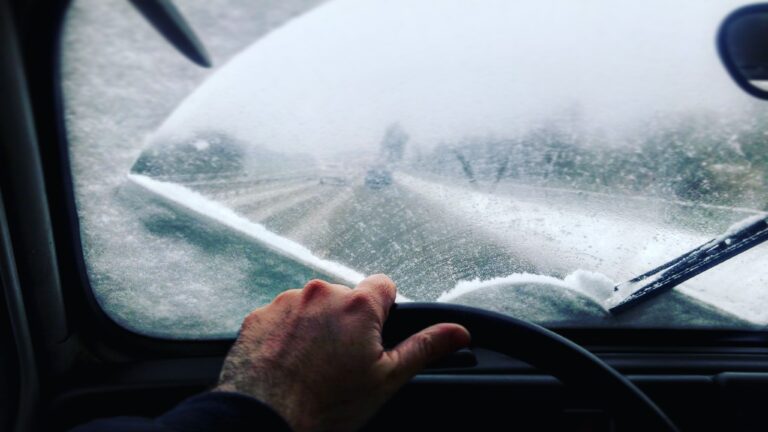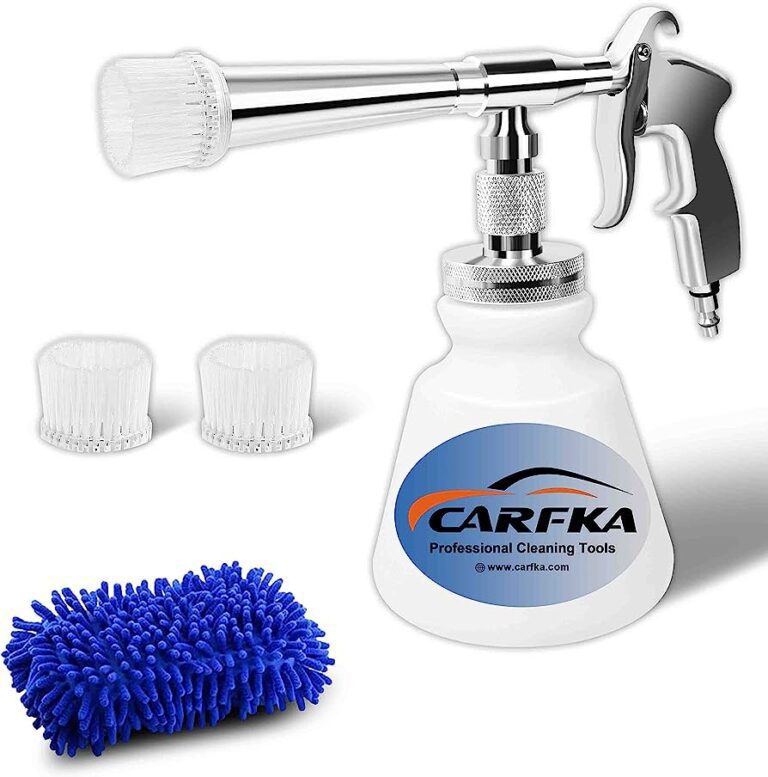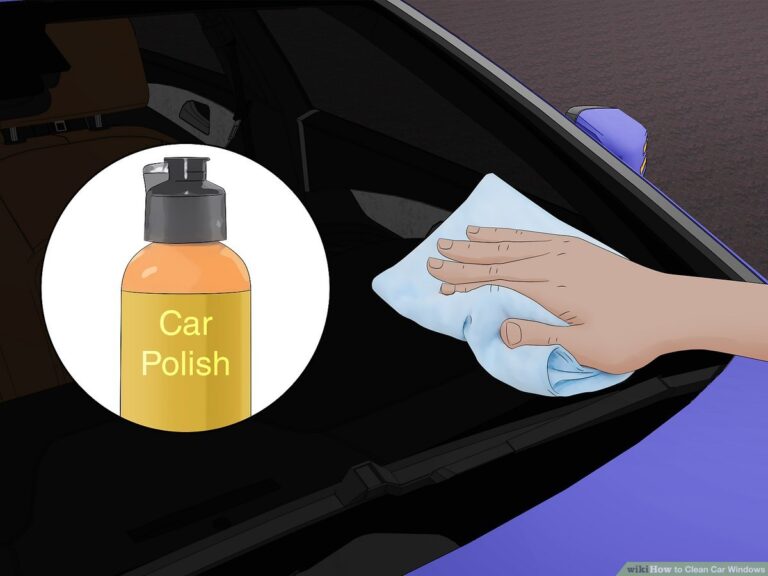Troubleshoot Your Windshield Washer Fluid Not Spraying Like a Pro
If your windshield washer fluid is not spraying, it could be due to clogged nozzles or a faulty pump. To troubleshoot the issue, start by checking the fluid level and clearing any blockages in the nozzles with a needle or pin.
If that doesn’t solve the problem, it may be necessary to replace the pump or seek professional assistance. Your car’s windshield wipers are essential to maintain clear visibility while driving. When dirt, dust, or grime accumulates on the windshield, the windshield washer fluid helps to clear it off.
However, if you notice that your windshield washer fluid is not spraying, it could be due to a variety of factors. In this article, we’ll discuss the common reasons why your windshield washer fluid may not be working as well as some troubleshooting tips to get it up and running again. By addressing this issue quickly, you can ensure that you have a clear view of the road ahead while driving.

Credit: www.wikihow.com
Common Causes Of Windshield Washer Fluid System Failure
Windshield washer fluid not spraying: common causes of windshield washer fluid system failure
Keeping your windshield clean is paramount for safe driving. Running out of washer fluid or having a faulty system can make it difficult to clean your windshield, which can create a driving hazard. In this section, we’ll take a look at some common causes of windshield washer fluid system failure and what you can do to fix it.
Dirty Or Clogged Washer Nozzles
Dirty or clogged nozzles are one of the most prevalent causes of a washer fluid system failure. Over time, a buildup of dirt, grime, or debris can block the washer nozzle and prevent the fluid from spraying onto the windshield.
Here are some key points to keep in mind about this issue:
- If you notice washer fluid is not coming out of your nozzle or is spraying weakly, the nozzle may be clogged.
- You can clear the nozzle by using a pin to gently poke the opening. Be careful not to damage the nozzle though.
- Alternatively, you can use a small needle to clear out the nozzle opening and remove any blockages.
Faulty Washer Pump
The washer pump is responsible for pressurizing and circulating washer fluid from the reservoir to the nozzle of your vehicle. Without this critical component, the entire system would fail to work. Here are some main points to keep in mind about a faulty washer pump:
- If you hear the pump working but no fluid comes out, there may be a blockage in the system.
- If there is no sound when you activate the washer, the pump may be faulty.
- A replacement washer pump may be required if there is no solution to fixing the pump.
Cracks Or Leaks In Washer Fluid Reservoir
Cracks or leaks in the washer fluid reservoir can result in a lack of fluid needed to spray on your windshield. Here are some essential points to keep in mind about this issue:
- Inspection of the reservoir for leaks and cracks is necessary.
- Replace the reservoir if you find any leaks or cracks in the plastic material
- If the level of fluid in the reservoir is not dropping, this may indicate a problem with the pump or nozzle and a closer inspection is recommended.
Low Levels Of Washer Fluid
This may seem like an obvious cause of windshield washer fluid failure, but it is commonly overlooked. Ensure you maintain an appropriate amount of washer fluid in the reservoir. Here are some key points to keep in mind about low levels of washer fluid:
- Check your washer fluid levels regularly to avoid running out of fluid.
- Always have an extra bottle of washer fluid available in your vehicle.
- Keep in mind that dirty or clogged nozzles can use more fluid and deplete the reservoir more quickly.
It’s essential to resolve any windshield washer fluid system failures as quickly as possible to ensure safe driving conditions. By following these helpful tips, you can keep your windshield clean and ensure a clear view of the road ahead.
How To Diagnose The Problem With Your Washer Fluid System
Step-By-Step Guide To Diagnosing The Problem
Is your windshield washer fluid failing to spray? Here’s a simple guide to diagnose the problem with your washer fluid system:
- Turn your car engine on and activate the windshield wiper.
- Observe if there is any sound or movement from the washer motor, which is responsible for spraying the fluid.
- Check if any fluid is coming out of the nozzles.
- Inspect the windshield washer hoses for any visible breaks or kinks.
- If the problem is still unresolved, move on to the next step.
Tools Required For Diagnosis
Before diagnosing the problem, ensure you have the following tools ready:
- A washer fluid reservoir
- A voltmeter
- A pair of pliers
- A multimeter
- A flat-blade screwdriver
- A windshield washer concentrate
- A flashlight
Having these tools ready makes the diagnosis process much simpler and quicker. Carry out this step before proceeding with the diagnosis process.
Diy Fixes For Washer Fluid System Problems
Your windshield washer fluid is an essential component that helps keep the windshield of your vehicle perfectly clean and clear. However, at times, certain problems may cause your washer fluid not to spray effectively. Here, we’ll explore some diy fixes that you can try to resolve these common washer fluid system problems.
Techniques To Unblock Clogged Washer Nozzles
If your windshield washer fluid isn’t spraying correctly, it’s possible that one or both of your washer nozzles may be clogged. It’s a common issue that can be resolved by using the following techniques:
- Use a straightened paper clip to clear out any blockages in the nozzle’s opening gently. Be careful not to damage the nozzle.
- Blow pressurized air through the nozzle to dislodge any debris that may be blocking it.
Replacing A Faulty Washer Pump
In some cases, the washer pump may be the reason why your windshield washer fluid isn’t spraying correctly. To check if the washer pump is faulty, here are a few things to look out for:
- Check the power source for the washer pump. If the fuse or wiring is damaged, the pump may not function.
- Check if you can hear the washer pump motor running. If it isn’t, it may need to be replaced.
- If it’s clear that the washer pump isn’t functioning, remove and replace it with a new one.
Techniques To Repair Cracks Or Leaks In Washer Fluid Reservoir
A crack or leak in your washer fluid reservoir can cause your washer fluid not to spray or to spray sporadically. The following are some techniques you can use to repair cracks or leaks:
- Identify the crack or leaks in the fluid reservoir.
- Use a plastic welder to fix minor cracks.
- For larger cracks, use an epoxy resin to patch the crack.
- If the leaks are from the washer fluid pump or hoses, replace them with new ones.
By using the above techniques, you can fix most washer fluid system problems. However, if none of these fixes seems to be working, it’s advisable to take your vehicle to a mechanic to have it looked at.
When To Call A Professional
Windshield Washer Fluid Not Spraying: When To Call A Professional
Have you ever had a dirty windshield and tried to use your washer fluid, only to find that it’s not spraying? This can be a frustrating and potentially hazardous situation, especially if you’re driving in inclement weather. While some issues can be resolved with basic troubleshooting, there are situations in which it’s important to seek professional help.
Here are some key points to keep in mind:
Situations In Which It’S Important To Seek Professional Help:
- If your washer fluid pump is broken, it may need to be replaced by a professional. Attempting to fix a broken pump on your own can be dangerous, as it involves working with electrical components and potentially hazardous chemicals.
- If your windshield wiper blades are worn or damaged, this can cause issues with the fluid not spraying properly. While you may be able to replace the blades on your own, if the problem persists, it’s best to consult with a professional. They can determine if there are any underlying issues that need to be addressed.
- If your washer fluid reservoir is leaking or damaged, a professional may be needed to repair or replace it. This can also involve working with potentially hazardous chemicals, so it’s best to leave it to the experts.
Questions To Ask When Choosing A Repairman:
- What experience do you have working with windshield washer fluid systems? It’s important to hire someone who has expertise in this area to ensure that the problem is properly diagnosed and repaired.
- What is your pricing and availability? While cost is a factor, it’s also essential to ensure that the repair can be completed in a timely manner to minimize any inconvenience.
- Are you licensed and insured? It’s important to hire a professional who is licensed and insured to protect yourself from any potential liability.
Remember, when it comes to diagnosing and repairing issues with your windshield washer fluid system, safety should be your top priority. Don’t hesitate to seek professional help if you’re uncertain about how to proceed. With the right expertise, your windshield will be clear and clean in no time!
Frequently Asked Questions On Windshield Washer Fluid Not Spraying
How Do I Fix Windshield Washer Fluid Not Spraying?
To fix this issue, start by checking if the reservoir is full and the pump is working properly. If not, replace the pump, check the hoses, and clear any clogs or blockages. Also, ensure that the nozzle is not clogged.
What Causes Windshield Washer Fluid Not To Spray?
There are several potential causes, including a faulty washer pump, a clogged nozzle, empty or low washer fluid reservoir, damaged hoses, or a blown fuse. Check all of these components to diagnose the issue.
Can You Put Water Instead Of Windshield Washer Fluid?
While you can use water instead of windshield washer fluid in a pinch, it is not recommended. Water can freeze in cold temperatures, potentially causing damage to your windshield washer system. Additionally, washer fluid is specially formulated to clean and remove debris from your windshield.
How Often Should You Replace Windshield Washer Fluid?
It is recommended that you replace your windshield washer fluid every six months, especially if you live in an area with harsh winter conditions. However, you should also routinely check your fluid levels and refill as needed.
How Much Does It Cost To Fix A Windshield Washer Fluid System?
The cost of fixing a windshield washer fluid system varies depending on the specific issue and the make and model of your vehicle. Generally, repairs can cost anywhere from $50 to $200. Consult a trusted mechanic for a proper diagnosis and repair cost estimate.
Conclusion
After reading this comprehensive guide, you should be able to diagnose why your windshield washer fluid is not spraying and the steps to take for troubleshooting. Remember to inspect the washer fluid pump, windshield wiper nozzles, hoses, and fuse to identify the root cause of the problem.
Also, check for clogs and leaks in the system and replace faulty parts as needed. Regular maintenance of the windshield washer system is crucial, and you should clean it out at least once a year to prevent any buildup that could cause problems in the future.
By following these simple steps, you can ensure that your windshield washer fluid system remains in good condition and you are prepared for clear visibility during your drives.





